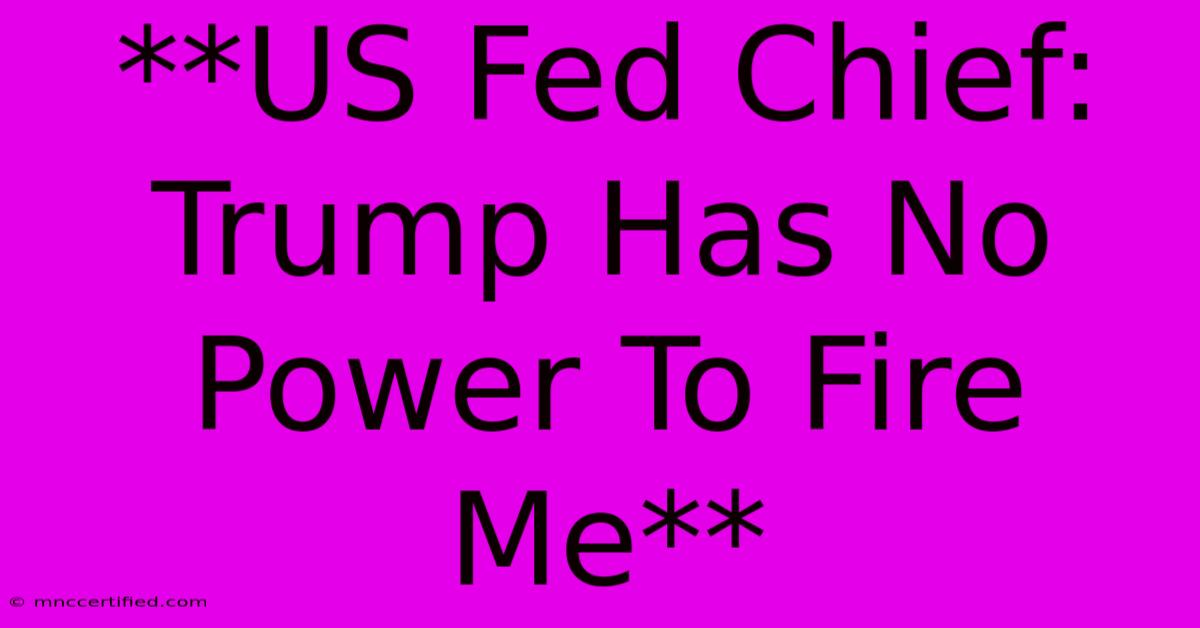**US Fed Chief: Trump Has No Power To Fire Me**

Table of Contents
US Fed Chief: Trump Has No Power To Fire Me
The Chairman of the Federal Reserve, Jerome Powell, has firmly stated that President Donald Trump cannot fire him. This assertion comes amidst ongoing tensions between the Trump administration and the central bank, with the President publicly criticizing Powell's monetary policy decisions.
A Constitutional Debate
The power of the President to remove the Federal Reserve Chair has been a subject of debate for decades. While the Constitution outlines the President's authority to appoint the Fed Chair, it does not explicitly address the possibility of removal.
Powell's statement, however, draws on the Federal Reserve Act of 1913, which establishes the Federal Reserve as an independent entity. This act defines the Chair's term as four years, with the possibility of reappointment by the President. Crucially, the act does not allow for the President to remove the Chair before the end of their term except in cases of "neglect of duty" or "malfeasance in office."
Trump's Criticism and Powell's Response
Trump has repeatedly expressed dissatisfaction with the Federal Reserve's interest rate hikes, arguing that they stifle economic growth. He has also publicly criticized Powell, calling him "a big problem" and suggesting that the Fed is "raising interest rates too fast."
Powell, in response, has maintained that the Federal Reserve operates independently of political influence and that its decisions are solely driven by economic data. He has stated that "the Federal Reserve is independent, and it is designed to be independent" and that the Fed will continue to make decisions that are "in the best interest of the American people."
Implications for Monetary Policy
The ongoing tension between the White House and the Federal Reserve raises concerns about the potential for political interference in monetary policy decisions. Critics argue that Trump's public attacks on Powell undermine the Fed's independence and could lead to politically motivated decisions that harm the economy.
Supporters of Powell's stance, however, argue that the Fed's independence is crucial to ensuring stable economic growth and preventing inflation. They maintain that the Fed must be free from political pressure to make decisions based on economic data and not on political expediency.
Conclusion
The power struggle between the President and the Federal Reserve Chair underscores the delicate balance between political and economic considerations in setting monetary policy. While the President's influence over the Fed is limited, the ongoing tensions highlight the importance of protecting the Fed's independence to ensure sound economic management. As the economic landscape continues to evolve, it remains to be seen how this dynamic will play out and what impact it will have on the U.S. economy.
Keywords: Federal Reserve, Jerome Powell, Donald Trump, monetary policy, interest rates, independence, economic growth, inflation, Federal Reserve Act, political interference, financial markets, economy.

Thank you for visiting our website wich cover about **US Fed Chief: Trump Has No Power To Fire Me** . We hope the information provided has been useful to you. Feel free to contact us if you have any questions or need further assistance. See you next time and dont miss to bookmark.
Featured Posts
-
Hamas A Threat To Palestinian Progress
Nov 08, 2024
-
4 75 Rate Cut Bank Of England Announcement
Nov 08, 2024
-
Trumps Return Aclu Prepares For Legal Battles
Nov 08, 2024
-
Stephen A Smith Distances From Kimmel
Nov 08, 2024
-
Fc Barcelona Codorniu Sign New Agreement
Nov 08, 2024